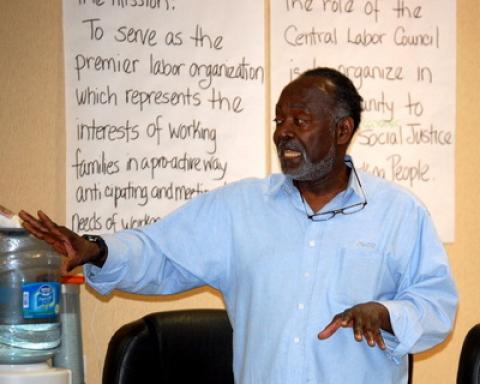labor Joslyn Williams Passing Baton to New Leadership; After 34 Years at Labor Council Helm
For the first time in 34 years, Joslyn N. Williams’s name will not appear on the officer election ballot for the Metropolitan Washington Council, AFL-CIO, which is scheduled to elect new leadership February 22. Williams, the longest-serving and first African American president of the Labor Council, recently announced that he would not run again for the position he has held since 1982.
“I am just stepping down, not stepping away from the labor movement,” said Williams, who has been re-elected, mostly uncontested, every three years since taking on the presidency. “It’s time for someone else to move the work forward. I plan to redirect my energy from the battles of the metropolitan Washington area to the global arena.” (Click here to hear Williams discuss rights, justice and the unwavering resolve to make the King legacy real on WPFW last Friday).
“Jos Williams represents everything we admire about the American story,” said DC Congresswoman Eleanor Holmes Norton. ““He emigrated to the U.S. from Jamaica at 16, earned his college degree at Howard University, became a federal employee and emerged as a talented leader of his local union, the American Federation of Government Employees, and became the first African American president of the Metropolitan Washington Council, AFL-CIO, in 1982. Jos’ intelligence, energy, charisma, organizational skills, and strategic acumen combine all the essential elements of leadership. Knowing Josh, we should expect that he will redefine what retirement means and continue to offer his multitude of gifts to our city and region.”
Although the labor movement is confronting severe assaults from Wall Street to the Supreme Court, Williams expressed confidence in the new leadership. “Our workers face intense challenges, but the Council has vibrant, exciting new leaders who are ready to take the baton and lead,” said Williams, who described the labor movement as a “broad social justice advocacy movement.”
During his tenure, which spans seven mayoral administrations and five presidencies, Williams has been an influential voice for Washington-area labor. He championed the rights of area union members to live the American Dream, presiding over frontline fights for fair wages, safe working conditions, and access to affordable health care and secure retirements. Over the last decade in particular, he spearheaded a vigorous living wage campaign that in 2015 led to passage of a minimum wage indexed to inflation—a first for the District of Columbia, which now claims one of the highest minimum wages in the nation. Montgomery and Prince George’s counties also passed minimum wage increases on his watch.
Throughout, Williams adroitly balanced the interests of the nearly 200 affiliated locals, which represent more than 150,000 members from the transportation, telecommunications, health care and construction industries as well as the hospitality, entertainment, public utility, and federal and public sectors. Today, more than 95 percent of eligible local unions are affiliated.
Among the “crown jewels” of his achievements is the formation of the Council’s United Way-funded charitable arm, the Community Services Agency (CSA), for which he serves as board president. The CSA works with union locals and community, religious, student and political allies to improve the lives of workers and their families throughout the greater metro Washington area by meeting their human and social services needs off the job.
The Metro Council under Williams leadership was also one of the first labor councils in the country to be designated a Union City by the AFL-CIO, building one of the biggest and most effective mobilization and communication programs in the country. By 2015, the program's award-winning Union City email newsletter and social media reached more than 30,000 local activists daily.
Working closely with legendary labor leader Tony Mazzocchi, Williams founded the DC Labor FilmFest in 2001. The popular annual film festival, dedicated to showing films about work, workers and workers’ issues, has since expanded into the DC LaborFest, which includes labor music, art, books, history and more and is one of the largest labor cultural events in the nation.
During Williams’s tenure the Metro Council also established the Claimant Advocacy Program, a free legal counseling service for DC workers who file unemployment appeals in the District of Columbia.
In addition to steering the Council’s support for its affiliated locals, Williams has advanced a view of labor as part of a broader social and economic justice movement for racial equality—beginning in the 1960s with his position as shop steward at the Library of Congress and, later, as president of American Federation of Government Employees Local 1826.
“Back then, Blacks saw unions as detrimental to them,” Williams said. “Our movement helped them see that we could accomplish more if we were inside the house rather than tearing it down.” In the process, “we created a Black middle class in the nation’s capital.”
“Labor pushed for civil rights laws and was the major force in protecting the public sector—not only for workers, but for citizens of the jurisdictions we represent,” he added.
Williams noted that today’s labor issues are eerily similar to those that existed at the dawn of the union movement in the late 19th century, a Gilded Age characterized by disproportionate wealth and extreme corruption. Then as now, he said, hostile employers and unsympathetic governments exploited workers. “In that era, they were lobbing vicious attacks against workers with guns and batons,” Williams said. “Today, they are armed with suits and maneuvers that undercut workers from Wall Street to the state house to the U.S. Supreme Court. Corporate giants are maintaining profits by paying workers as little as possible.”
The threat, he added, extends beyond the United States. “The fight is on every continent,” Williams explained. “American workers are losing jobs because employers have been given the green light to take their industries—along with wholesale exploitation of workers—overseas.”
Williams plans to shift his activism to labor issues worldwide. “This is no longer an American problem,” he said. “It’s a global problem, and we need global strategies to solve it.”


Spread the word